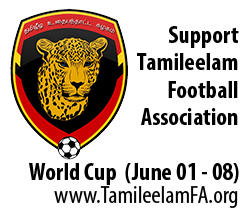Archive for the ‘Tamil History/Culture’ Category
11th Anniversary of Sencholai MassacreBy Editor - August 14th, 2017 |
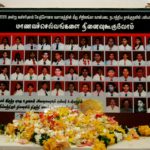 |
|
Imagine yourself in a classroom, in the midst of a civil war. You are fearing the worst, but continue your life as a normal day. You head to your all female school and are in the classroom. Around 7:30am, when you are barely awake you hear an aircraft flying above you. You have been taught to duck and seek shelter. However, it is too late. Everything goes dark, and you hear a huge blast. What is it? Am I alive? Can I open my eyes? These questions run through your mind. You open your eyes, and try to move. Your leg is pinned down by a piece of debris. |
Sri Lanka: A Not So Paradise Island,By Editor - March 24th, 2016 |
 |
|
Sri Lanka: A Not So Paradise Island, is a conference held by Tamil Youth Organization – Canada (TYO) to educate everyone about the real face of Sri Lanka. Many people believe that “the war has ended” in 2009, however, the Tamil natives of the island continue to be oppressed and face structural genocide |
Regenesis – Book DriveBy Editor - May 29th, 2015 |
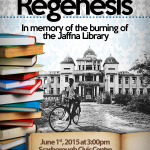 |
|
Regenesis: new birth, renewal. A book drive will be held at Scarborough Civic Centre on June 1 starting at 3:00 p.m., in memory of the burning of the Jaffna Library on the nights of May 31st and June 1st, 1981. All books will be donated to the SickKids Hospital. |
Thangachi’s Corner: What is your background?By Editor - February 27th, 2015 |
 |
|
Where am I from? That’s the question I posed my grade four’s last week when one of the girls walked in at the beginning of the period, readily prepared to burst into tears. And it’s certainly a problematic question, isn’t it? After all, by “from”, I could be referring to the geographical location from which I arrived to Canada. Or perhaps I mean the country from which my parents immigrated here. It’s an altogether tricky question, especially when taking into consideration a rather diverse community made up of various cultures, languages and religious beliefs. |
News Release: CTYA Welcomes NPC ResolutionBy Editor - February 12th, 2015 |
 |
|
On February 10th, 2015, the Northern Provincial Council (NPC), with overwhelming support, passed a resolution calling for an international investigation into the ongoing genocide perpetrated by the Sri Lankan Government against Eelam Tamils. The Canadian Tamil Youth Alliance (CTYA) welcomes this resolution as a meaningful move towards justice and the freedom of the Eelam Tamil Nation. |
Opening of Bharathy Noolagam, OttawaBy Editor - January 24th, 2015 |
 |
|
Noolagam, nool meaning book and agam meaning home, has found a home again in Ottawa, Ontario. Bharathy Noolagam was opened in Ottawa on November 1st, 2014 with the hard work of volunteers, administrators, and the Ottawa Tamil community. Ottawa with its small Tamil community has always aspired to have a Tamil Library so that its current and future generations can learn Tamil and enjoy Tamil literature. Bharathy library was initiated 10 years ago by the community and functioned in a small fashion. With a modest amount of books, the library survived and later closed due to unforeseeable circumstances. |
Structural Violence and Structural Genocide: Building a feminist framework of national oppression and national liberationBy Admin - December 22nd, 2014 |
 |
|
Written By: Jessica Chandrashekar and Roshni Raveenthiran The following is a discussion that emerged out of a conference that dealt with questions of feminisms and structural violence in contexts of war, authoritarianism and genocide. We focus on the presentation that Tasha Manoranjan gave titled “Gendered Genocide: Sri Lanka’s War Against Tamils”. The purpose of this piece is to share what we learned from Tasha’s talk, as well as our thoughts on structural violence and the Tamil genocide. By naming violence as ‘structural’ we are showing how violence is more than just one individual harming another individual. Violence is made possible and enabled by institutions such as the legal system, the state and the media. These institutions are created or structured so that some people gain certain privileges and protections, while other people are oppressed. We want to open up a discussion about the structural dynamics of the Tamil genocide. We feel that this discussion is important and necessary, particularly in our current context. In this current moment the UN OISL is writing their report and will make recommendations to the international community; there are debates on dropping the term ‘genocide’; and Eezham Tamils- particularly those in the Vanni, are struggling against colonization and military occupation. The month in which we began our discussion is significant because our conversations on structural violence and the Tamil genocide took place during November. November is the month of Maaveerar Naal, a day of remembrance of those who sacrificed their lives for the freedom and liberation of Eezham Tamils. As such, we discussed three questions and below we share with you our collective thoughts. [read more inside] |
Waiting For DawnBy Admin - November 17th, 2014 |
 |
|
Written By: Keera Ratnam That day has not yet come. My people, the Tamil people, and I have been suffering from physical and mental torture. We’ve been stripped our rights and privileges – and have become muted. Despite all the suffering, we are not able to speak our voices. Why, you may ask? Why we have not spoke out? But the truth is, we are not allowed to speak. And when we do try to let our voices be heard, it is silenced. From the tiniest quarrel from our youngest living to the last standing alive. But do not worry, my brothers and sisters are not hopeless. We too believe that we will be free one day. We left our homes, family and dreams in search of a new day and to bring a day of light to our people. We are the children of today, we must work to give light to the ones that will rise tomorrow. We took oath. An oath to fight till the end, and we must vow to fight, from dawn till dusk, until a new horizon is risen. We walked many miles, up many hills, dug many bunkers, fled from forest to forest, and fled from house to house. We held on to every mother and father, and promised to protect them as our own. We watched our friends cry in pain, fall within our arms asking us to hold on tight, tighter. We carried the dead, to put them to rest, and took them home for their families to see. Mothers yelled, cried and fell down to their feet. Asking their child’s body if they can have the one last chance to meet, talk, hug. Many of us lost arms and legs. Many lost their lives and some gave up their livelihood. They did not rest, they did not stop, they went on as each fighter fell. As death came closer, they said, beneath the ground we shall go, but will up-rise again as young springs and continue on with our journey until the rays of sunlight from tomorrow shines upon us with delight. From Dawn till Dusk we shall not sleep, beneath the ground we shall not rest, until the day has come for the birth of our nation. |
Spice Garden: Jeerakam (Cumin)By Admin - July 5th, 2014 |
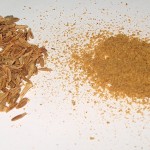 |
|
Written By: Kayalvizhi J. Welcome to Spice Garden! Love Tamil food? Me too. I’ve always been attracted to the aromas, fragrance and textures of spices, the way the flavours just blend and intertwine and the way we serve our food and by the repertoire of herbs and spices we use for healing. Last time we looked at the spice, milagu. Today we will be looking at jeerakam (cumin). Quick Benefits: Cumin seeds are used in Tamil foods whole or ground, and is a main ingredient in many curry dishes. Although small, these seeds pack intense flavor and have a peppery taste. The flavor and aroma of cumin seeds are best brought out when they are slightly roasted. They have a variety of benefits as listed above. One way to enjoy the benefits of cumin is through cumin tea. Cumin tea To make cumin tea, you need 2 teaspoons of coarsely pounded cumin and 1 cup of water. Boil the water, and add it to the cumin seeds and let this steep for 5minutes. Strain the liquid and drink it. (Yes, the taste isn’t the best, but this is beneficial!). Is there a particular spice you want to learn more about? Leave a comment and I’ll try to include it in the coming weeks. Until next time, enjoy your tea! =) Disclaimer: This blog provides general information and discussion about medicine, health and related subjects. The words and other content provided in this blog, and in any linked materials, are not intended and should not be construed as medical advice. If the reader or any other person has a medical concern, he or she should consult with an appropriately-licensed physician or other health care worker. |
Spice Garden: Milagu (Black Peppercorns)By Admin - June 10th, 2014 |
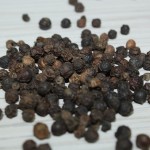 |
|
Written By: Kayalvizhi J. Welcome to Spice Garden! Love Tamil food? Me too. I’ve always been attracted to the aromas, fragrance and textures of spices, the way the flavours just blend and intertwine and the way we serve our food and by the repertoire of herbs and spices we use for healing. Our cooking is not only tasty, but beneficial for the body. The levels of obesity and disease in all communities is increasing, but we can prevent this by adopting more of our ancient healing into our cooking. Your grandma and mom have a good knowledge of home remedies and recipes made with a variety of herbs and spices to promote healing and maintain good health. And we, the younger Tamil youth should also become knowledgeable about these things, and this blog is an attempt to impart some knowledge about Tamil spices, herbs and recipes. While I may be biased saying Tamil cuisine is the tastiest in the world, the world has also noticed. Tamil cooking has been praised all around the world, and Tamil cooking influences can be seen in other cuisines, and in the English language. For example, the English word ‘Curry’ is derived from the Tamil word, Kari, ‘Mango’ from Maangai, ‘Conjee’ from Kanji, Ginger from Inchiver. Tamil Sangam literature and epigraphs chiseled in walls of ancient Tamil temples have also recorded information about the benefits and preparations of Tamil herbs and spices. Today we will be looking at the spice, milagu also known as yavanappiriyam (black peppercorns). Quick Benefits: – Digestion If you’ve had Tamil food, it is likely it would have had some black pepper corns in it. Peppercorns are added to many savoury dishes, especially to meat and chicken. Black pepper helps in digestion and its aromatic flavour helps flavour in meat and poulty dishes while helping masking ‘meaty’ smells (especially when mixed with garlic). Pepper is ground when used in dishes. Pepper is also used in home medicine to treat coughs, colds, fevers, asthma and constipation. A mixture of salt and pepper with caraway leaves used as a gargle can help fight cough. In many cultures, you may have notices certain soups are eaten as appetizers before means to increase appetite. In Tamil cuisine, rasam acts as the appetite stimulant and includes black peppercorns. Rasam can be consumed at different periods in a meal; eating rasam before meals is to induce appetite, while eating it after is to promote digestion. It is the pepper in the rasam that contributes to both these benefits. So next time you are making a meat dish, try to sprinkle some peppercorns into it. |

